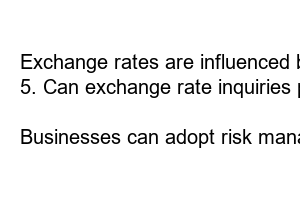과거 환율조회
Title: Past Exchange Rate Inquiry: Understanding the Impact on Global Markets
Introduction:
Understanding past exchange rate inquiries is crucial to comprehend the intricate dynamics of global financial markets. In this blog post, we will delve into the significance of exchange rates, their impact on the economy, and how they influence various sectors.
Subheading 1: What are Exchange Rates and Why Do They Matter?
Exchange rates represent the value of one currency in terms of another and play a pivotal role in international trade, investments, and tourism. These rates directly impact imports, exports, inflation, and the overall economic stability of a nation.
Subheading 2: The Determinants of Exchange Rates
Various factors shape exchange rates, including interest rates, inflation, political stability, economic performance, and market speculation. Understanding these determinants aids in predicting future trends and creating effective monetary policies.
Subheading 3: The Historical Significance of Exchange Rate Inquiries
Throughout history, exchange rate inquiries have shed light on economic crises, such as the 2008 financial meltdown. By examining exchange rate patterns, economists and policymakers can identify vulnerabilities within the global financial system and implement measures to mitigate risks.
Subheading 4: The Impact of Exchange Rates on International Trade
Fluctuations in exchange rates directly impact the competitiveness of a country’s exports and imports. A weaker currency can make exports more attractive, stimulate economic growth, and improve a nation’s balance of trade. Conversely, a stronger currency can make imports cheaper but may hinder export competitiveness.
Subheading 5: Exchange Rates and the Financial Sector
The financial sector is highly influenced by exchange rates, particularly regarding cross-border investments and foreign exchange markets. Volatile exchange rates can lead to significant gains or losses for investors, making it vital to comprehend exchange rate trends to make informed investment decisions.
Subheading 6: Exchange Rates and Tourism
Exchange rates influence tourism by determining the affordability of traveling to a particular destination. A strong currency can deter foreign tourists, whereas a weaker currency can attract an influx of visitors, boosting local economies and the hospitality industry.
Subheading 7: The Role of Exchange Rates in Economic Stability
Exchange rates serve as a barometer for economic stability. Governments and central banks closely monitor exchange rates to control inflation, stabilize prices, and ensure a favorable economic climate for businesses and individuals alike.
Summary:
Past exchange rate inquiries have showcased the indispensable role of these rates in global financial markets. By understanding exchange rates’ impact on various sectors, such as international trade, the financial industry, and tourism, individuals and organizations can navigate the ever-changing economic landscape more effectively. Moreover, exchange rate inquiries enable policymakers to implement measures to safeguard economic stability and mitigate potential risks.
FAQs:
1. How frequently do exchange rates change?
Exchange rates are subject to constant fluctuations depending on various economic factors, and can change daily.
2. Can individuals benefit from exchange rate fluctuations?
Yes, individuals can benefit from favorable exchange rate fluctuations by capitalizing on foreign investments or taking advantage of cheaper travel expenses.
3. How do exchange rates impact inflation?
Exchange rate changes can influence the prices of imported goods and services, ultimately affecting the overall inflation rate of a country.
4. Are exchange rates solely determined by the market?
Exchange rates are influenced by both market forces and government interventions, such as monetary policies and foreign exchange interventions.
5. Can exchange rate inquiries predict future trends accurately?
While exchange rate inquiries provide valuable insights, accurately predicting future trends is challenging due to the complex nature of global financial markets.
6. How can businesses manage exchange rate risks?
Businesses can adopt risk management strategies, such as hedging or setting appropriate pricing structures, to mitigate the impact of exchange rate fluctuations on their operations.

